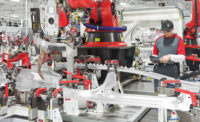Takeaways on how to innovate
-including the ten thousand hour principle

 Frans Johannsson, author, lecturer and entrepreneur, has made the rounds on network news shows, mostly discussing his two books, “The Medici Effect” (2004; published in 17 translations) and “The Click Moment” (2012). His opening keynote at AIHce 2013 focused on innovation for the lay person, for all of us in the business world. Here are takeaways from his 50-minute rapid-fire, high-energy talk:
Frans Johannsson, author, lecturer and entrepreneur, has made the rounds on network news shows, mostly discussing his two books, “The Medici Effect” (2004; published in 17 translations) and “The Click Moment” (2012). His opening keynote at AIHce 2013 focused on innovation for the lay person, for all of us in the business world. Here are takeaways from his 50-minute rapid-fire, high-energy talk:
Combine utterly different concepts and cultures in your work, your work teams, your brainstorming, etc.
The need for innovation has never been greater than in today's tech-driven, hyper-drive business world.
We are trapped by our past successes, making innovation that much more difficult.
The life cycle of companies is shrinking; another reason that innovation is imperative.
Logic and expertise do not drive all success. Malcolm Gladwell’s ten thousand hour principle, which says if you practice anything for ten thousand hours, you will be a success, works well in athletics and with chess grandmasters better than it does in the board room. Who has spent ten thousand hours in a boardroom? Netflix was not created through ten thousand hours of practice.
| All new ideas are combinations of existing ideas. |
True insight and breakthroughs happen unexpectedly, through serendipitous conversations, etc. You don’t plan nor expect these breakthroughs to happen.
Look at your own career. Did it unfold and progress the way you thought it would?
Which is more important, serendipity or strategy? Is strategy useless if it is basically a repackaging of what’s already been done? We use strategy because we never do anything random. Strategy gives us a purpose, a reason to move forward. But sometimes it is worth staying utterly random, leaving room for the unexpected, for creativity.
Strategy convinces us to act. But you should experiment now and again. Introduce the unexpected, the surprising, into your act.
Pull together different perspectives at work, on teams and such. Create an “intersection” of ideas and insights. You never know where they will come from. Architect Frank Lloyd Wright was inspired by the architecture of the catus.
All new ideas are combinations of existing ideas.
People who change the world simply try out many more ideas than the average person. Einstein wrote 254 papers. Picasso created more than 50,000 works of art. Many of these creations and endeavors had no impact whatsoever. In fact, most did not. The point being, some people just keep trying, keep at it, more than most.
Embrace diversity in your business dealings. Bring in, talk with, different disciplines, different backgrounds, different experts. You unleash an explosion of ideas. The song “Tubular Bells” resulted from a combination of classical music and rock and roll.
Diversity drives innovation.
Use your network of connections, colleagues and peers, to create your own diverse culture of advisors, mentors, and collaborators.
Change the way you work. Called it “forced collaboration.” Push for cross-over of disciplines on teams. Don’t hire people just like you. Surround yourself with people just like you and you’ll get a replay of the same ideas. Strangers working together might not say “hello” to each other for the first two weeks, but give it time and give them purpose. One of the most important leadership skills is deciding how to incorporate other perspectives into your realm.
Looking for a reprint of this article?
From high-res PDFs to custom plaques, order your copy today!






